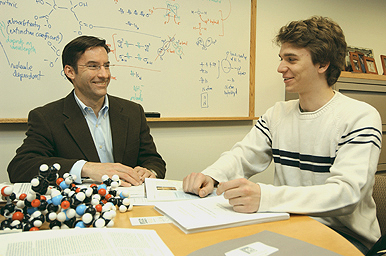Chemistry Professor John Straub: probing the causes of Alzheimer’s disease
$1.5 million grant will boost his research of amyloid formation

College of Arts and Sciences Chemistry Professor John Straub, who won one of BU’s Metcalf Awards for Excellence in Teaching last May, is known as a charismatic lecturer. But he is also internationally recognized for his research, especially in theoretical and computational chemistry.
Indeed, Straub recently received a $1.5 million grant from the National Institutes of Health (NIH) to probe the principles of amyloid formation. The effort is a continuation of his research in this area, which is laying the groundwork for insights into the causes of degenerative neural disorders such as Alzheimer’s and Huntington’s diseases.
Straub and his colleagues are trying to determine why certain proteins form large deposits of needle-like filaments known as fibrils in the brains of patients suffering from Alzheimer’s disease. “We all have tens of thousands of proteins in our body, and most of those can be metabolized without aggregating and forming deposits,” says Straub. “But in certain cases amyloid proteins simply don’t follow that normal process of metabolism, and end up forming aggregates.” These aggregates, or masses, may have cytotoxic properties that affect neurological function.
Straub’s multifaceted approach includes using computational models and experimental collaborations to look at the sequence of the amyloid beta protein, along with a second disease-related protein, the amylin polypeptide, which also forms aggregates and is associated with type-II diabetes.
Such studies may lead to drugs that will reduce or reverse amyloid formation in the brain. “This is a big focus of the NIH,” says Straub. “We were one of the first theoretical groups in the world focusing on this problem. It’s becoming a much more active area, and we feel very fortunate to continue to be supported to do this research.”